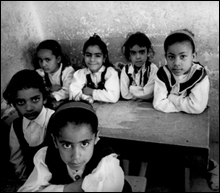
FACING OUR FUTURE: Movie-makers show us the way. |
If you’ve already had enough of this summer’s box office thrillers (we won’t name names, Superman), look no farther than the Maine Social Forum’s film festival, taking place this weekend in Lewiston. The forum is a gathering of progressives across the state talking about ways to make Maine a better place, and the films all tie into the theme of activism and social justice. The festival will feature mostly films by Mainers about Maine, and showcases a range of filmmakers from the professional to students with little or no filmmaking experience. The films will be shown Friday evening and Saturday throughout the day, running in conjunction with the conference activities.Three feature-length films will anchor the festival: Death Before Slavery, Growing Together, and The Future of Food. The rest are less than a half-hour long. The best-known film showing is The Future of Food, which is also the only film made by a non-Maine native. The film, directed by Deborah Koons Garcia (Jerry's widow), focuses on the genetic engineering of food and explores different and more sustainable farming practices.
Growing Together is a film made by Mainer Melissa Paley about sprawl and smart growth in Maine and New England. The film looks at case studies of different communities in New England, including Scarborough, and analyzes the ways the communities have changed.
Craig Saddlemire, who organized the film festival, is hoping that bigger names like The Future of Food will draw a larger audience, many of whom will stick around to watch some the lesser-known films. Some of the shorts include Free Trade at What Cost?, a film made by students from the College of the Atlantic in Bar Harbor, which examines how international free-trade agreements relate to Maine. Another is Fowl Play, which looks at the conditions at factory farms where most eggs are produced, and compares that method to free-range egg farming. And let’s not forget Black Fly Remedies, a film that pokes fun at the state’s annoyance with those pesky little buggers.
Most of the films are documentary style, but there are a few that aren’t, like Trap, a film set in 1920s Maine about a broken marriage, and Departure, a “poetic” piece about lives lost in the Iraq War. Each film, or slate of films in the case of shorts, will be followed by a discussion with the director or activists.
Though most films directly relate to Maine, according to Saddlemire, those that don’t can still have meaning to Mainers because they deal with issues similar to ones in the state. One of the feature films, Death Before Slavery, made by South Portland filmmaker Victor Damian, is about unrest in Bolivia and the increasing exploitation of the country’s resources.
“[Death Before Slavery] deals with the issue of natural resource privatization which has been an issue in Maine, especially with water,” Saddlemire says. “Bolivia is a country that has dealt with the issue of privatization of oil and natural gas. Natural gas isn’t so much an issue in Maine, but water is.”
Though some films were made by professional filmmakers, don’t expect them all to look stellar. Some were made by students with no previous filmmaking experience and some by activists more concerned with getting their message across than with the art of film.